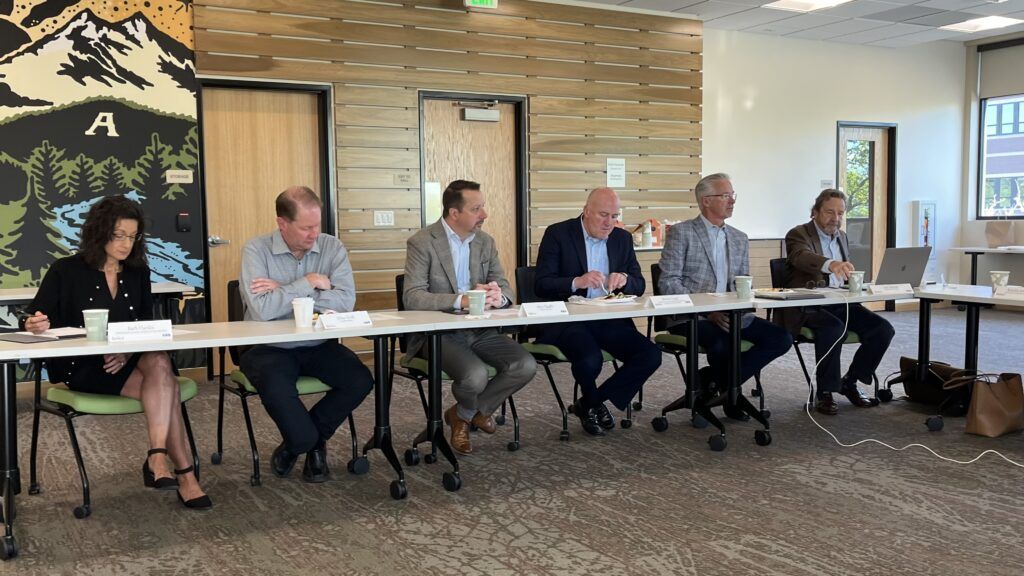CEO Roundtable: Good news, bad news face health care execs

FORT COLLINS — First the bad news: Violence against health care workers has not abated since the pandemic.
And the good: Staffing-level concerns have moderated to the point that health care companies can focus more on helping make workplaces more appealing to staff members.
Health care CEOs and other executives met Tuesday morning at BizWest’s CEO Roundtable, hosted at Elevations Credit Union’s community room in downtown Fort Collins.
SPONSORED CONTENT
How market participation facilitates the region’s renewable energy use
Platte River Power Authority joined an organized energy market in 2023 and will join another in 2026. Read more about the how these efforts benefit the communities of Estes Park, Fort Collins, Longmont, and Loveland.
A year ago, when a similar group of health care executives met, they noted that violence against nurses and others at their facilities had spiked during the pandemic. Conditions have not improved, they said this year, to the point that hospital systems have stepped up security. In the case of Banner Health, which operates hospitals in Fort Collins, Loveland and Greeley, security teams have brought in canine assistance.

“We have canines,” said Alan Qualls, CEO for Banner in Northern Colorado. “The head of our security program was with the DEA (Drug Enforcement Administration),” he said, noting he had experience with how people react to dogs. “When someone is getting out of control in the ER (emergency room), we bring the dog around, and it’s amazing how they settle down. Even if they’re on meth.
“The clinical staff feels that being assaulted is part of the job, and it’s not part of the job,” he said.
Kevin Unger, president and CEO of UCHealth’s Poudre Valley Hospital and Medical Center of the Rockies, said violence against workers was not something the system experienced prior to the pandemic.
“It’s become an expectation (among workers) that if you go into nursing at some point you’ll be assaulted, and it’s sad,” Unger said. UCHealth has implemented a badging program so visitors have to sign in and indicate where they are going. “We’ve had to increase our security,” he said.
Christina Salas, CEO of Northern Colorado Long Term Acute Hospital and Northern Colorado Rehabilitation Hospital said so far those small hospitals in Johnstown have not experienced an increase in violent acts, which has been fortunate. “When you’re a small organization, to hire security for the one time a month that it might happen is a financial issue,” she said.
Kaiser Permanente, also, is seeing an increase, said Dr. Greg Berman, vice president and executive medical director at Kaiser in Northern Colorado. “We’re getting good at security events, at security training. It’s necessary. A bigger piece of employee health and wellness is tied to this,” he said.

Even at the level of hospice care, workers have experienced more violence, said Evan Hyatt, president of Pathways Hospice. Since most of the patient contact is at homes for hospice workers, and not in the hospice facility, “We have guidelines for staff about what situations they can go into.” He attributed the increased incident level to a rise in mental health concerns.
“And substance abuse,” Qualls said. “It started during the pandemic; it was always there but people were pushed off a cliff.”
Unger said the incidence of violence is somewhat societal. “Social norms are changing. People are a little more snarky. We’re also seeing much sicker patients. That has led to different behaviors,” Unger said.
Labor force
While the headaches over workplace violence are ongoing, medical practitioners are experiencing relief in securing workers who through much of the pandemic were in critically short supply.
“Our turnover rate is the best it’s been in years. It’s not anything like it was,” Qualls said.
Barb Hardes, chief operating officer at the Orthopaedic & Spine Center of the Rockies, said staffing concerns “run in waves. We’re now seeing challenges with radiology.” She said that radiology schools had bigger classes before the pandemic, but then during the pandemic students couldn’t be placed, so classes became smaller. Now, they’re starting to rebuild class sizes, she said.

Dr. John Bender, CEO of Miramont Wellness Centers, agreed that technical positions remain “a troubled area.” He said workers with customer service skills are important, and he likes to find workers with good customer skills and train them for other duties.
Miramont is now an employee stock ownership company, which provides an incentive for employees.
Salas said the rehab hospital and long-term care hospital still find it difficult to recruit nurses, “for some reason on the night shift” where previously the hospitals had no difficulty recruiting.
Hardes said that career paths have changed for the people that Orthopaedic and Spine Center recruits. “We’re no longer seeing people come in on a MA (medical assistant) track; they want to go on to being a PA (physician assistant) or on to medical school.”
Hardes is concerned about burnout of workers on shifts where staffing is short. “Do we hire more CNAs to help the licensed staff?”
Regulation
All participants were concerned about new regulations that make staffing medical facilities more difficult. The FAMILI leave program — Family Medical Leave and Insurance Program — allows workers in Colorado to take leaves for certain circumstances without losing their jobs.

Employers are able to opt out, and Bender said Miramont has done so and created its own leave program because of concerns that employees who take leave under the state program would have to wait lengthy periods of time to be compensated.
Salas said employees under FAMLI get 48 hours of “free call-off time” without having to explain to the employer why. FAMLI coupled with Ernest Health corporate policies can mean lengthy periods where employees can be gone. “This affects the workforce; it affects teamwork. We’re trying to find a balance.”
Colorado law also affects how facilities staff their nursing floors with the staffing matrix determined by the nursing staff. Any changes to the matrix have to go through the staffing committee, which can be limiting.
Unger said short-staff situations often result in managers working bedside roles when staff members call out for their shifts.
“The law was designed for employers who didn’t have paid time off,” said Banner’s Qualls. “For those of us who had (PTO), this is double whammy.”
Kendra Johnson, a broker with Flood and Peterson insurance agency, said the new laws are “a problem everywhere, not just health care.”

“You can leave for way more reasons. It affects trucking, retail, school districts. … This is not going to go away. There are valid reasons for it, but some (workers)are taking advantage of it.”
Luc Koldewyn, practice director at the Colorado Spine Institute, said with 13 employees, “having two out can be brutal. We’re all doing multiple roles.”
Kaiser, Berman said, is trying to be proactive with the new laws and is using artificial intelligence to improve the workplace. AI can help reduce the time needed to document patient visits and “remove the computer from between the patient and the doctor.”
Koldewyn said his organization also uses AI for transcribing patient visits. “It can also input the things needed for Medicare” documentation, he said.
Other issues
Health care facilities also face issues with reimbursements from insurers and from government entities such as Medicare or Medicaid. When reimbursements don’t match costs, “cost shifting” occurs, making elective procedures more expensive.
The problem may be most acute in rural areas where patient counts are lower to start with.

“Many rural facilities are giving up on procedures. OB (obstetrics) are the first to go,” Unger said, with many rural areas, especially in Wyoming, providing no access to OB care.
“People are driving for hours to deliver a baby. Craig is no longer delivering babies. Same in Rawlins (Wyoming). The list goes on,” he said.
Johnson said that Flood and Peterson is working to find ways for employers to reduce costs, because some are paying millions of dollars a year on health care for their workers. Direct contracting between an employer and a health care network has been effective.
“Putting in cost containment and education around good behaviors” also has been effective. “When you’re self-funded (instead of insured), you can have more control as an employer and have better value for employees. You take the middleman (the insurer) out and you get better care,” Johnson said.
Bender said “it takes courage” to go the self-funded route, and taking steps to work around established systems can be difficult in the face of liability.
“You can put this on my tombstone. ‘Sometimes the opposite of careless is not careful, but courage,’” Bender said.

Johnson concurred that employers need to be more courageous in health care. “Sometimes patients go to urgent care (because of the lower cost) but then get sent to the ER because of concerns over liability. We can get better and improve,” she said.
“We don’t disagree,” said Unger about UCHealth. “A lot of things are done for liability reasons; we do things to be more defensive.”
The cost of regulation needs to be discussed, Qualls said. He described how regulators will “count the number of cigarette butts in the parking lot” to see if a health care organization is being proactive with smoking cessation programs. “If a regulator finds more than three, you get a citation. The amount of resources we put in to be ready for inspections” is enormous.
What’s to come
Population growth — with Weld and Larimer counties leading the state in population growth — means that health care entities will continue to expand.
UCHealth is building onto the Medical Center of the Rockies in Loveland and likely will not be building any new hospitals in the near term. However, UCHealth will open two or three primary care clinics in the coming year, including a site in Berthoud, another in Fort Collins and in Greeley.
“We have a growth trajectory in primary care and want to keep people out of emergency departments,” Unger said.

Hyatt said that growth for Pathways Hospice is “focused on Weld County.” He also noted that hospice patients are tending to be older than they once were, and with the first wave of Baby Boomers now 80 years old, “that’s where we’re seeing growth.”
Qualls said that the market can be unsettled as a result of private equity investors getting involved in health care. “When private equity comes to town, things get interesting,” he said, noting that what might appeal to investors today might not be the same later, thus resulting in facility shutdowns and gaps in medical coverage.
Coincidentally, CBS News reported Tuesday about those same concerns with private equity facilities.
CEO Roundtables in Northern Colorado are sponsored by Elevations Credit Union, law firm Berg Hill Greenleaf Ruscitti, and accounting firm Plante Moran. The sponsors were represented Tuesday by Darin Atteberry, Ashley Cawthorn and Mike Grell, respectively.


